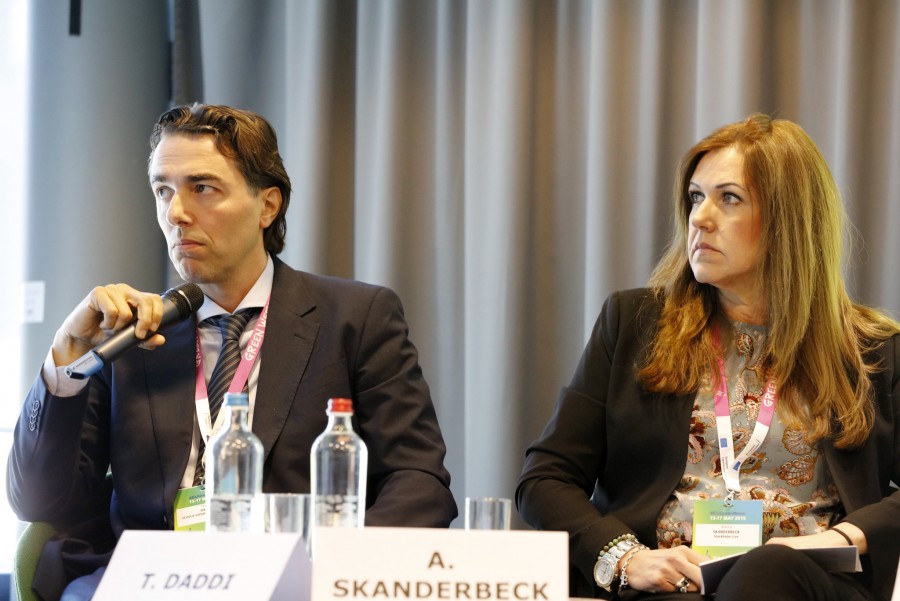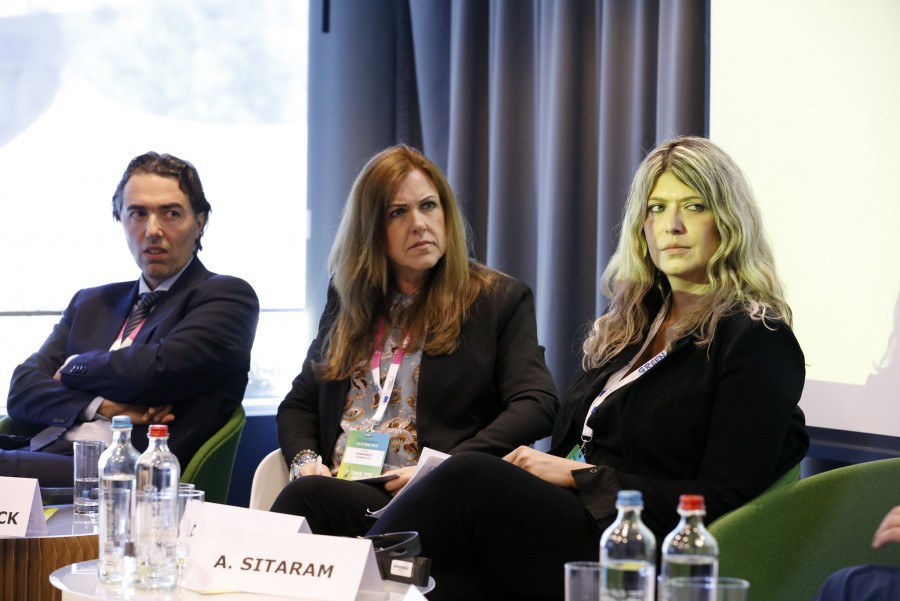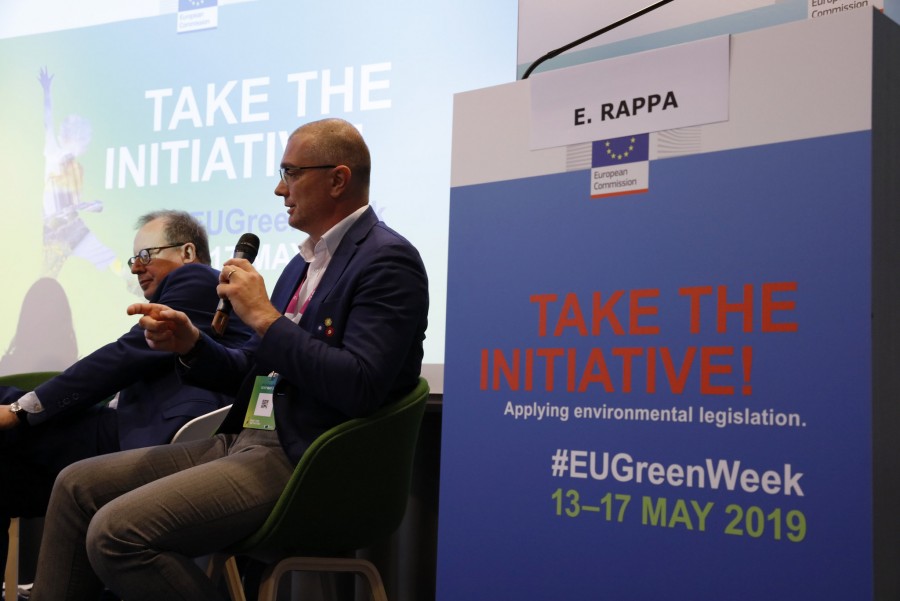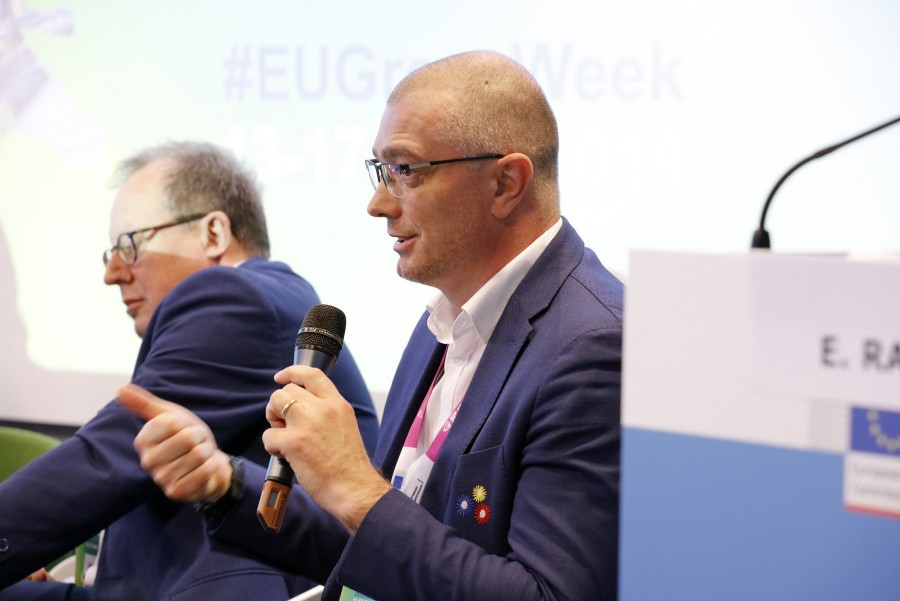The club is highly committed to increase its societal sustainability standards: a new training centre is about to get opened, putting in place innovative measures and features to make it sustainable and circular. Acknowledging the greatest potential of football as a fundamental social “catalyst” to raise awareness, Real Betis Balompie has adopted a Green strategy: establishing deals with original and sustainability-oriented programmes (UN Climate Neutral Now) and companies (firstclimate, GreenEarth), using 100% recycled jersey shirts, and, last but not least, taking part to the LIFE TACKLE Project within the Members of replicability management board.
Following, Emanuele Rappa, CEO of REVET, has presented its company, an integrated waste management company that serves the 80% of Tuscany municipalities. Its goal is to launch a new concept of stadium’s seats, made out of recycled products. A pilot is about to be launched for the small stadium of Pontedera (Italy), aiming at replacing at least 30-40% of current plastics-made seats. Although, there are obstacles of both technical and economic nature: the market costs of sustainable seats is still higher than plastics ones, but REVET is committed to fill this gap and make the product actually marketable.
After these two first presentations, the debate has got to the heart of the matter, giving the project partners the opportunity to discuss the opportunity and the threats of sport events’ management.
Tiberio Daddi, from Sant’Anna University of Advanced Studies of Pisa, Italy, has made it clear that the lack of data and monitoring concerning stadiums and sport infrastructures represents a problem.
Although, on the basis of the figures obtained, it has emerged that the negative environmental impact produced by football events is caused by the energy and water consumption, the waste production, and, above all, by the supporters’ mobility.

Actually, as highlighted by Cristina Blasetti from the National Italian Football Federation (FIGC), it is not only a matter of old, non-sustainable sport infrastructures: a deep and rapid change in the approach towards sport events is an absolute necessity for supporters, managers and local authorities, to bring effective improvement on the environmental impact of such events.

Then, Florin Sari, from the Romanian Football Federation (FRF) and in charge of the organisation of EURO 2020 Final tournament in Bucharest, has presented the 3 pillars of the strategic approach adopted by FRF:
1. Investing on education, information and awareness raising campaigns
2. Converting stadiums to energy efficiency
3. Investing on and adopting new technologies as a tool towards sustainability.

From its side, UEFA (Union of European Football Associations) gives more and more importance to the sustainability chapter when evaluating bids from National Federation to host UEFA competitions, Patrick Gasser – head of UEFA Football and Social responsibility unit – said. In particular, three aspects are taken into account: energy consumption; circularity model; and mobility. About the latter, Mr Gasser recognises it as the major environmental contributor: for this reason UEFA will compensate supporters’ flight travels for EURO 2020 matches, as well as will make the tournament’s 12 hosting cities offer free public transports on match-days.

But LIFE TACKLE will also develop innovative Green Procurement solutions: as Mr. Daddi stated, for major sport events great purchases and commercial deals are made; under this perspective, Green procurement shall play a crucial role.
The project can also benefit from the great, positive impact that football players have on the public to raise awareness and, as the ultimate goal, contribute to the achievement of the global UN Sustainable Development Goal n. 13: fighting climate change.
Takeaway messages:
- Football clubs have the power and potential to act as “social megaphones”: not only they can carry out awareness campaigns reaching a widest audience, but also they are means of social aggregation, bringing people closer to sustainability issues.
- For this reason, there are huge potentialities to bring about a concrete shift of mentality through the campaigning and educative channels the wide world of sport offers.
- Not only for supporters. Innovation starts from good and responsible management of sport infrastructures and firms: the adoption of green procurement standards; the continued renovation of structures; the adoption of new technologies.
- To reach our goals globally, international cooperation is crucial: not only international raising awareness is more efficient, but through mutual learning and co-creation processes, good practices and opportunities already available shall be shared, fostered and better implemented.
- Circular economy is progressing fast, although the market prices of recycled products is still higher than linear-economy products, therefore hindering the spread of circularity.
If you are interested to watch the event streaming, please click here!















Follow our journey